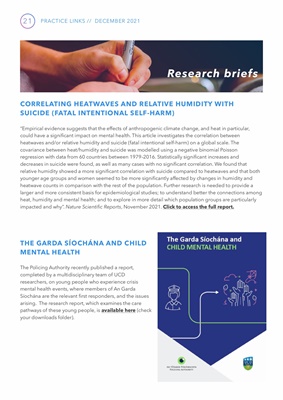
CORRELATING HEATWAVES AND RELATIVE HUMIDITY WITH
SUICIDE (FATAL INTENTIONAL SELF-HARM)
"Empirical evidence suggests that the effects of anthropogenic climate change, and heat in particular,
could have a significant impact on mental health. This article investigates the correlation between
heatwaves and/or relative humidity and suicide (fatal intentional self-harm) on a global scale. The
covariance between heat/humidity and suicide was modelled using a negative binomial Poisson
regression with data from 60 countries between 1979-2016. Statistically significant increases and
decreases in suicide were found, as well as many cases with no significant correlation. We found that
relative humidity showed a more significant correlation with suicide compared to heatwaves and that both
younger age groups and women seemed to be more significantly affected by changes in humidity and
heatwave counts in comparison with the rest of the population. Further research is needed to provide a
larger and more consistent basis for epidemiological studies; to understand better the connections among
heat, humidity and mental health; and to explore in more detail which population groups are particularly
impacted and why". Nature Scientific Reports, November 2021. Click to access the full report.
THE GARDA SÍOCHÁNA AND CHILD
MENTAL HEALTH
The Policing Authority recently published a report,
completed by a multidisciplinary team of UCD
researchers, on young people who experience crisis
mental health events, where members of An Garda
Síochána are the relevant first responders, and the issues
arising. The research report, which examines the care
pathways of these young people, is available here (check
your downloads folder).
Research briefs
21 PRACTICE LINKS // DECEMBER 2021